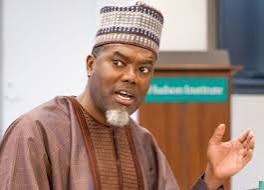Why former NCC Chair, Ndukwe should not be in MTN Board
By Reno Omokri
Right now, the headquarters of corruption in Nigeria is MTN Nigeria Limited.
Does it not amount to the height of conflict of interest for the former head of the Nigerian Communications Commission, Ernest Ndukwe, who still has his loyalists in the NCC, to be not just on the board of MTN Nigeria Limited, but also the board Chairman? Where else on Earth can this anomaly be tolerated?
The NCC is the regulator of the telecommunications industry. It is like the Governor of the Central Bank of Nigeria finishing his tenure and then going to chair a foreign bank doing business in Nigeria.
Recent revelations surrounding MTN Nigeria’s governance and business practices cut to the heart of what is broken in Nigeria. They show that there is a revolving door between key regulatory offices in government and the board of MTN Nigeria. A cosy relationship between the two can only mean biased rules in their favour, unfair competition and a rotten deal for the people of Nigeria. The costs are not just in the form of higher prices, they also are costs to our reputation and trustworthiness as a destination for foreign investment.
Even in South Africa, MTN’s home country, such a travesty would not be accepted. For a foreign company engaged in cannibalistic exploitation of its competitors to pick as its Chairman of the board the former CEO of the public corporation that regulates the industry. This is why South Africa is presently prosecuting Meta, the parent company of Facebook, for unfair competition because WhatsApp is allegedly unduly suffocating South African companies, GovChat and #LetsTalk.
South Africa’s Competition Commission is not allowing Meta to do in their country what we allow MTN to do in Nigeria.
Not done with such brazen antitrust practices, MTN appointed the former Executive Chairman of the Federal Inland Revenue Service, Ifueko Omoigui Okauru, as a board member. Imagine the conflict of interest here. No wonder they had the guts to unilaterally charge other telecommunications providers interests on tax that they had no business collecting. Because they have inside men giving them insight.
Who is actually the Government of Nigeria? Is it the one headed by President Bola Tinubu, or the alternative government led by MTN’s board? Because when any organisation starts imposing and collecting tax on others. It has become a government.
The government of Asiwaju Bola Tinubu ought to look into this corporate corruption. The President is an accountant. He must be familiar with antitrust and how it destroys healthy competition and fosters monopolies.
Nigeria’s regulatory bodies must demonstrate their autonomy and impartiality by conducting a thorough investigation into MTN Nigeria’s business practices. The potential collusion between former government officials and corporate entities undermines public trust and erodes the credibility of Nigeria’s regulatory institutions. Investors need certainty and respect for the rule of law, or else they will overlook Nigeria and take their money to our competitors.
Because you cannot have a company which has been officially branded a dominant and hostile monopoly by Ghana, a neighbouring country, now taking advantage of Nigeria’s weak regulatory regime by packing its board with former heads of critical regulatory agencies, who have an undue advantage with the regulators and can influence them against Nigeria’s interest and for the benefit of MTN.
Not only have they sunk their fangs deep into the state and created their own deep state, which is a swamp that needs to be drained, where regulators are undermined and no longer independent, they have even undermined our legal system by having a former Chairman of the Nigerian Bar Association, Abubakar Balarabe Mahmoud, on their board.
The Nigerian government should ask themselves whether or not it is in Nigeria’s interest to have a former minister with regulatory authority over telecoms on the board of MTN. Imagine that these individuals approach their former subordinates in these Ministries, Departments and Agencies and ask them to bend the rules in favour of MTN. What does the government of Nigeria think will happen?
Recently, veteran journalist, Bayo Onanugu, Special Adviser Information and Strategy to President Tinubu, complained about moles in the civil service feeding official secrets to the opposition and other outside parties. It is because of practices like the shenanigans MTN is engaged in, that this is possible.
Is it not because of practices like this that the United States moved against Microsoft for antitrust violations in the United States v. Microsoft Corp.
Timing is critical. The Italy-Africa Summit underscored Europe’s commitment to fostering economic development and partnership with African nations. Nigeria must seize this opportunity to reassess its policies and practices. By aligning with international standards and leveraging partnerships with the European Union, Nigeria can enhance its credibility and foster a transparent business environment conducive to sustainable economic growth. The benefits will stretch beyond the telecoms sector and be felt across the wider economy.
MTN’s undermining of the system is too brazen. Too brazen. Imagine having Omotola Johnson, a Minister of Communication Technology, on the MTN board. Again, who is the government of Nigeria between the Tinubu administration and the MTN monopoly?
What is the definition of antitrust? Actions of a corporate entity that prohibits fair competition and promotes monopoly. MTN is the classic dictionary definition of antitrust violations, and the Nigerian government will do well to intervene now, like Ghana, which fined MTN $773 million for similar practices, before this behemoth becomes bigger than the government. We have heard of Banana Republics. May Nigeria not end up as a Telecom Republic!

